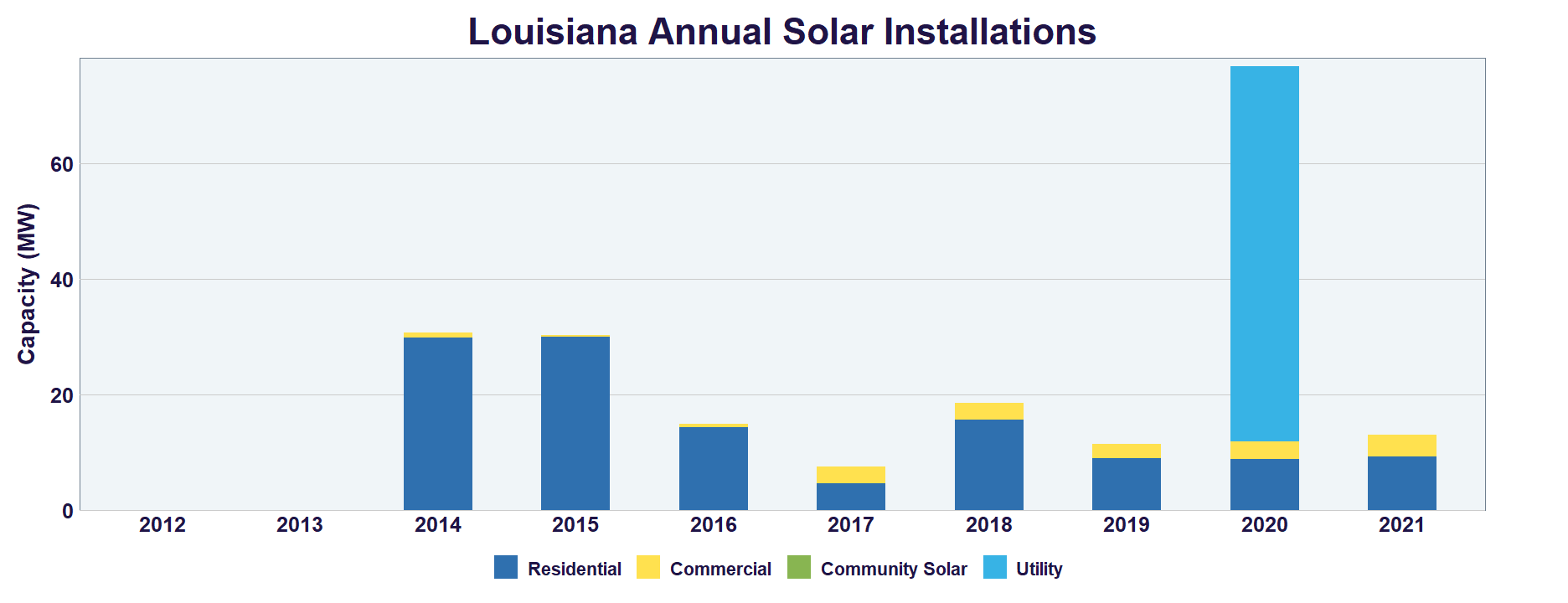The City of New Orleans has officially launched its citywide community solar program, in partnership with Madison Energy Investments. a firm which develops, constructs, owns and operates distributed generation assets and Solar Alternatives, under which the city will construct a series of solar gardens, which interested residents can purchase a “share” of, and receive a credit on their electricity bills for their share of the power produced.
The program, its rules, and the policies and procedures outlining its deployment throughout the city were all developed by the city council, and the council will also take an active role in project development, holding approval rights over solar garden locations to make sure they align with the city’s underserved neighborhoods. The city is also exploring city-owned sites such as rooftops and vacant land for developing the projects.
Participation is open to all electric customers within the city, even those who participate in other utility-sponsored renewable programs, like net metering. Customers may not subscribe to project shares that would exceed 100% of their annual energy usage, nor can a single customer subscribe to more than a 40% interest in a single project.
On the project side, installations are capped at 2MW in capacity, significantly smaller than the 5MW cap that is common nationwide for community solar programs, but not unheard of. Projects must have a minimum of three, 1kW subscribers. Multiple projects under 100kW with one owner may be located on the same property, but projects over 100kW must be on their own. multiple projects up to the 2MW cap can be located on the same property, so long as each has a different owner.
New projects may be built until each utility’s program capacity equal is equal to five percent of said utility’s annual peak in MW for the first three years of the Community Solar Program.
While utility service area-based community solar programs have sprung up in the south, specifically in Florida and Georgia, and municipal community solar program exist across the northern and northeast US, this is the first municipal community solar program known to pv magazine in the south.
“Our Community Solar program continues to highlight New Orleans’s role in leading the climate fight in our region and our commitment to Green Infrastructure throughout the City,” said Mayor LaToya Cantrell.
While the community solar program is all but certain to boost the city’s adoption of renewable resources, the claim that New Orleans and/or Louisiana are “leading the climate fight” is a bit tricker.
In 2019, the City Council has approved Entergy’s plan to add 90 MW of solar power to the city via three projects, a move that effectively looked to double the state’s entire installed solar capacity to that point. Since that point, the state of Louisiana has upped its total installed solar capacity to just over 200 MW, according to the Solar Energy Industries Association (SEIA) and Wood Mackenzie, with the majority of capacity that has come online since 2019 coming from utility-scale installations in 2020.

Over the next five years, Louisiana is expected by the SEIA and Wood Mackenzie to add 1,170MW of new solar capacity which, while only good for 27th in the nation over that time, is exponential growth relative to the state’s history.
“We couldn’t be more excited to be a part of this monumental program for New Orleans,” said Richard Walsh, managing partner of Madison Energy Investments. “Madison has projects like this across the country and as a southerner who grew up frequenting New Orleans, this project makes me particularly proud.”
This content is protected by copyright and may not be reused. If you want to cooperate with us and would like to reuse some of our content, please contact: editors@pv-magazine.com.









By submitting this form you agree to pv magazine using your data for the purposes of publishing your comment.
Your personal data will only be disclosed or otherwise transmitted to third parties for the purposes of spam filtering or if this is necessary for technical maintenance of the website. Any other transfer to third parties will not take place unless this is justified on the basis of applicable data protection regulations or if pv magazine is legally obliged to do so.
You may revoke this consent at any time with effect for the future, in which case your personal data will be deleted immediately. Otherwise, your data will be deleted if pv magazine has processed your request or the purpose of data storage is fulfilled.
Further information on data privacy can be found in our Data Protection Policy.